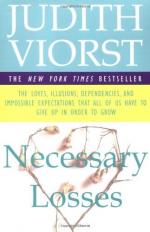
|
| Name: _________________________ | Period: ___________________ |
This test consists of 5 multiple choice questions, 5 short answer questions, and 10 short essay questions.
Multiple Choice Questions
1. At what age do we develop the superego?
(a) Eighteen.
(b) Five.
(c) Thirteen.
(d) Twenty-five.
2. What are the ingrained patterns repeated in adulthood due to childhood experiences called?
(a) Familiarity complex.
(b) Bad habits.
(c) Revisiting the past.
(d) Repetition compulsion.
3. Viorst feels that there is a always a grain of what in our love relationships?
(a) A grain of spite.
(b) A grain of hatred.
(c) A grain of insecurity.
(d) A grain of jealousy.
4. Sigmund Freud once said, "When you meet a human being, the first distinction you make is ______________?"
(a) Smart or stupid.
(b) Crazy or sane.
(c) Old or young.
(d) Male or female.
5. What happens when children see their mothers as all good or all bad?
(a) They form a very close relationship with their fathers.
(b) They compare everyone they meet to their mothers.
(c) They shun perfect and evil people alike, looking for complete mediocrity in the perfect mate.
(d) They split from relationships their whole life because they think in terms of black and white.
Short Answer Questions
1. As children, Viorst thinks we test reality with what?
2. Chapter 11 discusses our what?
3. Name the experimental psychologist who convinced people it was acceptable to continue shocking subjects despite their response to pain.
4. Which of the following, according to the author, may be an inappropriate way to deal with the grieving of childhood?
5. Who said, "To be a man, a woman, an adult, is to accept responsibility"?
Short Essay Questions
1. Why are we afraid of fantasies that portray socially unacceptable behavior?
2. Why did Art Buchwald, journalist and friend of the author, say that he understands about "scars on the brain"?
3. Why does J.D. Salinger's character from The Catcher in the Rye, Holden Caulfield, not want to grow up?
4. How does the author propose that some men compensate for their envy of a woman's ability to have children?
5. What did Alfred Adler note about the relationship between siblings and how it influences who we become as adults?
6. Why do psychologists think the "Mommy and I Are One" experiments worked?
7. Growing up means what, according to Chapter 10?
8. Using an example from the book, describe ways in which the Oedipus complex can play out in the lives of adults.
9. Denying hate prevents what, according to Winicott?
10. Endocrinologist Estelle Ramey uses what example to support her theory that virtually all differences between male and female are cultural?
|
This section contains 726 words (approx. 3 pages at 300 words per page) |

|




